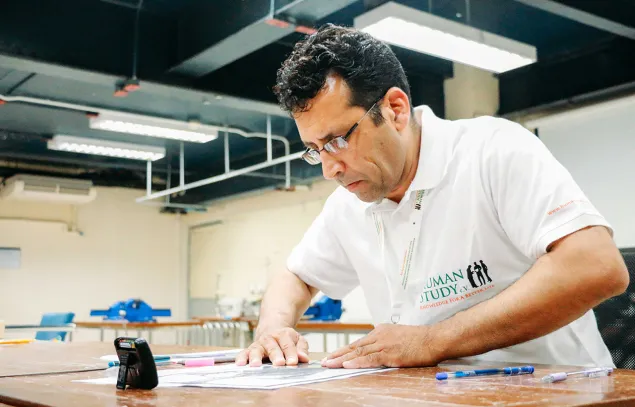Afghanistan: Nine professionals break new ground in long-term physical rehabilitation
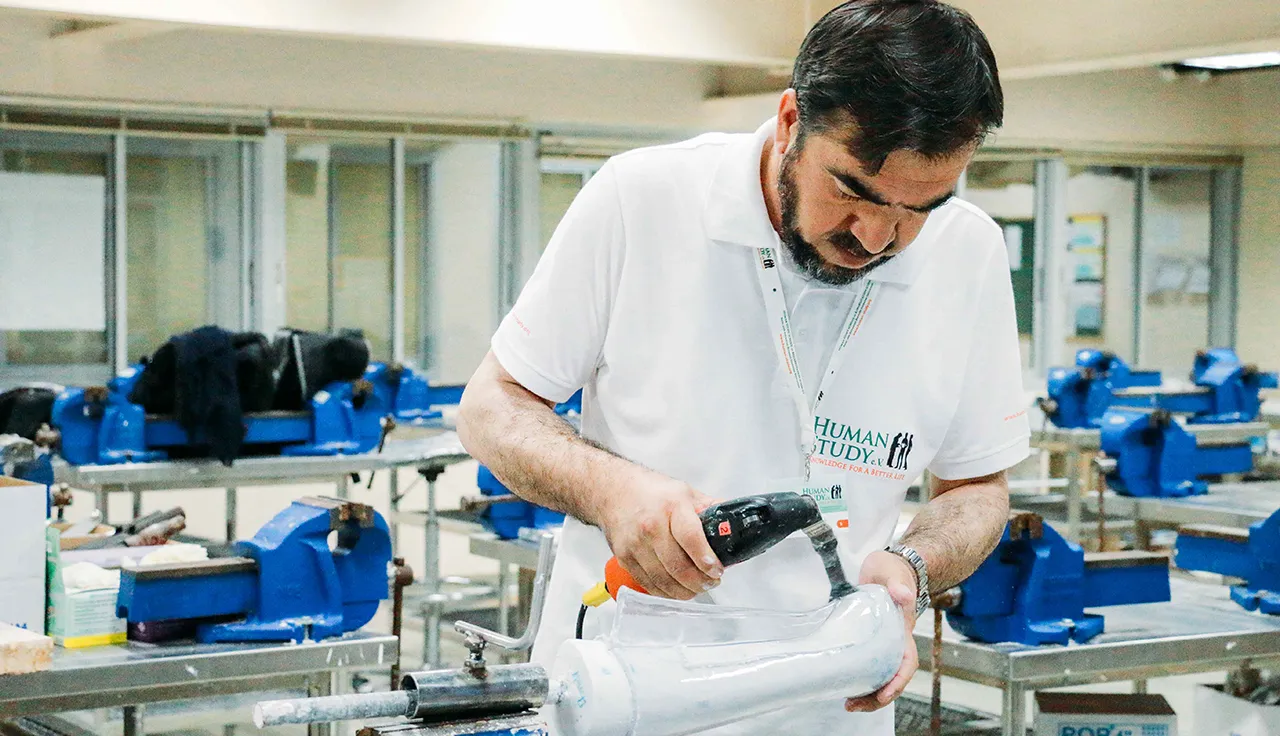
Having completed his bachelor's degree programme in prosthetics and orthotics, Afghanistan national Abdul Qadir Najm is raring to use his expertise to make life easier for those with disabilities. Driven by the need to serve, this Afghan national decided to upgrade his skills when he saw the rising number of people who had lost their limbs due to conflict-related injuries.
Together with eight others, Najm is part of a pilot project developed by the International Committee of the Red Cross (ICRC) in collaboration with Germany-based Human Study e.V. and International Society for Prosthetics and Orthotics (IPSO). The four-year degree programme is the first-of-its-kind to be conducted through a combination of online classes and on-site training. The batch of nine, including two women, successfully completed six semesters and graduated on clearing the five-day exam held recently in Bangkok. This is Afghanistan's first group of prosthetist-orthotists with Category I recognition from IPSO and they would now be able to treat very severe and diversified disabilities too.
"Knowledge is power," says Najm, talking about what prompted him to participate in the programme. "Physical rehabilitation can be a huge motivator for those with disabilities," he adds
His batchmate Mahpekay Sidiqy, who is from Kabul and a bilateral amputee, also acknowledges that they require updated skills and expertise to cope with the increasing number of people with physical disabilities. She also points out that hesitation in being treated by male doctors has kept many female patients from being rehabilitated. "Unfortunately, we lack female professionals in the country. My classmate and I are the first two women to be qualified as Category I prosthetist-orthotists. Hopefully, things will improve from now onwards," she says.
Over the last four years, Najm, Sidiqy and their batchmates continued to work and provide for their families while pursuing higher studies. Even the constant security threat, frequent power cuts and poor internet connection did not deter them from achieving what no one has yet managed in Afghanistan.
How the programme evolved
Responding to the growing need for professionals who can treat disabled people in Afghanistan, the ICRC collaborated with local authorities and started a diploma-level P&O training programme in 2004. This course was accredited as Category II programme by ISPO, which sets the professional standards.
"Afghanistan has seven ICRC-supported physical rehabilitation centres, making it one of the biggest Physical Rehabilitation Programmes (PRP) run by the organization. In order to empower the Afghan workforce and ensure long-term, high-quality rehabilitation services, we are looking into innovative ways of providing them with access to internationally-accredited continuing professional development," says Michael Rechsteiner from the PRP team in Geneva.
This led the ICRC to collaborate with Human Study e.V., which is a non-profit organization specializing in higher P&O education through blended learning. "We were already running a number of Category II programmes using a 'three-way blend', including online lessons, seminars & workshops and on-site training," says Christian Schlierf, CEO of Human Study e.V., adding that such a module is apt for candidates who cannot travel out of their home country easily.
For Afghanistan, however, Human Study, in close collaboration with the ISPO and the ICRC, decided to upgrade and develop a new curriculum corresponding to ISPO Category I or a BSc level programme. To gain accreditation for this unique Afghan Blended Learning Education, Human Study collaborated with Sirindhorn School of Prosthetics and Orthotics under Mahidol University in Thailand, an internationally renowned P&O training institute accredited by the ISPO on the highest Category I level.
The way forward
The nine Afghan professionals who have completed the P&O Category I also represent a breakthrough in long-term sustainability of physical rehabilitation services. The immensely-successful pilot programme has paved the way for replication in less-challenging contexts like Tanzania and Tunisia, among others. As Rechsteiner points out, training local professionals will ensure "long-term, high-quality rehabilitation services."
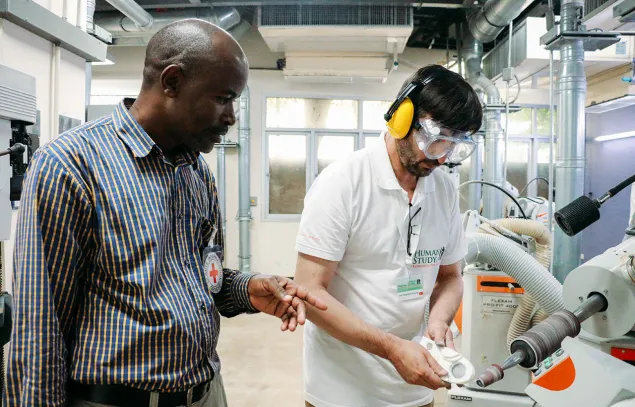
An ICRC specialist closely monitors a student during the exam in Bangkok.
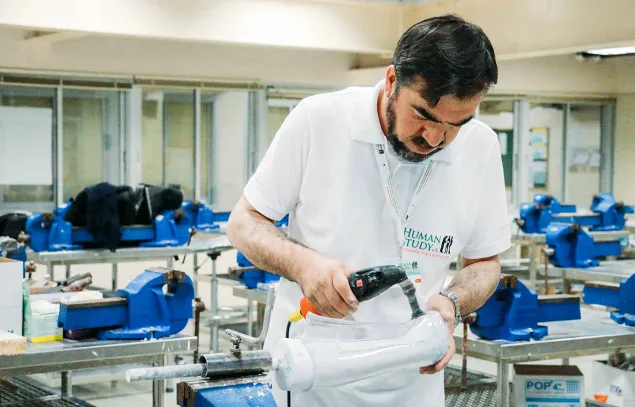
A student carefully crafts the device to fit the patient’s need. This is one of the hardest parts of the examination.
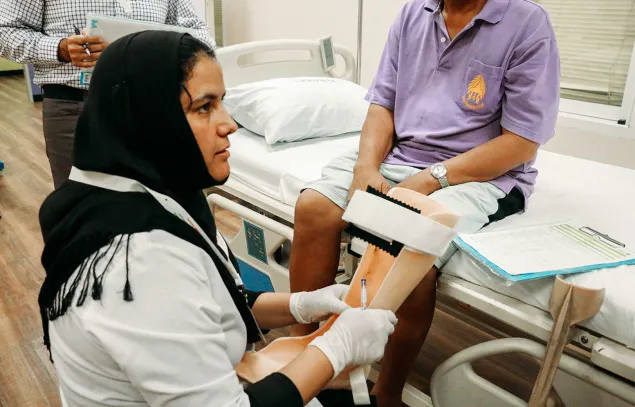
A female student evaluates and prescribes the appropriate devices for a patient as part of the exam.
